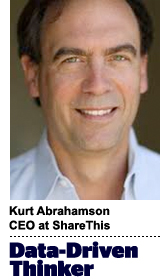 “Data-Driven Thinking” is written by members of the media community and contains fresh ideas on the digital revolution in media.
“Data-Driven Thinking” is written by members of the media community and contains fresh ideas on the digital revolution in media.
Today’s column is written by Kurt Abrahamson, CEO at ShareThis.
Facebook recently created a small panic in the marketing and data community when it announced that it would pull the plug on its Partner Categories program, therein eliminating third-party data sources from the platform.
The industry chatter I’m hearing suggests this has as much to do with the impending General Data Protection Regulation as it does with Cambridge Analytica. Whatever the case, the optics for Facebook appear favorable: Ban third-party data from the platform and two problems get solved in one fell swoop.
The move is also stirring quite a few water cooler conversations about who wins and who loses in a world where one of the biggest platforms is no longer third-party data friendly. Perhaps March Madness has turned everything into a competition.
Here’s where things could shake out:
The winners
Fortune Top 150 advertisers: I’ll say this a few times so we all can hear it: Marketers will always focus on personalizing experiences for their customers and prospects. Those who have deep pockets and invested in large data environments, Hadoop clusters and data science teams won’t bat much of an eye. Some may even find that a bit of a shake-up delivers better-targeted campaigns.
Ad agencies, particularly media agencies: The elimination of third-party data on Facebook heightens their role as data procurers, which may allow them to regain their roles as the go-to media strategists for their clients.
Google and other top-20 publishers: Google is well-positioned since it has first-party data, accepts third-party data and has scale. Oath, eBay, Twitter and Pinterest are great alternatives that bring extensive first-party and third-party partnerships for targeting on their platforms. These types of major publishers with verified PII finally present an effective alternative to Facebook, even if they’ve pitched themselves as such for years.
Demand-side platforms (DSPs): As marketers look for Facebook alternatives, DSPs will make sure all those third-party ready campaign resources are front and center. Leading DSPs are actually the de facto repository for marketers’ wealth of third-party data, and those that can show performance and even a touch of transparency will benefit.
The losers
Data providers: Oracle Data Cloud, Acxiom and their like are obviously the biggest losers, and it doesn’t appear to me that they have any clear path to get that revenue back. The situation may even get worse for them if other large platforms follow Facebook’s lead on third-party data.
Mid-size marketers: Mid-size marketers typically don’t have the in-house Hadoop capabilities that big advertisers have – and they will now have to procure their own data providers. Mid-size marketers who spend a lot of their budget on Facebook are about to find their world get more complicated – and expensive.
Global marketers: While there are benefits for some major advertisers, global marketers stand to lose because Facebook was the leader in allowing marketers to leverage third-party data – it was a global play. Unfortunately, there is no significant alternate player outside Facebook, on a global scale, with an identity layer and a third-party layer.
If you’re on this “loser” list, how do you get your way off of it?
If you’re a marketer, look at what Hadoop has to offer; it can be instrumental in helping you take user data from various systems, look for connections to identify users and reactivate that data through various channels. Yes, you’ll have to exert more control and effort, but the options are there. The better your grasp, the better you can understand how best to supplement the loss. Most marketers need to supplement insights beyond their own experiences, leveraging real-time sharing, interest and intent data at scale. If you are looking to create scale, look for first-party permissioned insights.
Prescriptions for data providers are harder; there’s no pick and roll that allows them to easily score on what for them is a radically altered court.
You may have noticed two constituencies that did not make either the winners or losers list. One is Facebook, and the other is the consumer.
Yes, Facebook appears to be a near-term loser, both in terms of its stock price and the obvious PR blows. While some consumer defections from Facebook will happen – with or without third-party data being banished from the platform – the truth is Facebook’s current problems will probably reinforce how central this go-to social platform is for billions of people. It’s simply difficult to recreate the Facebook experience elsewhere.
As for consumers, while the banishing of third-party data may be the first in a number of steps designed by Facebook to show it respects user privacy, will consumers notice this move in the day-to-day of memes, emojis and Facebook ads? Not likely.
Follow ShareThis (@ShareThis) and AdExchanger (@adexchanger) on Twitter.
This post was syndicated from Ad Exchanger.

More Stories
5 Ways Brands Can Weather a Tariff Storm as Consumer Spending Shifts Toward Value
Creativity shines
Hilton Uses Social Listening to Showcase ‘Superior’ Stays